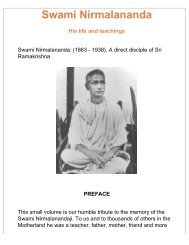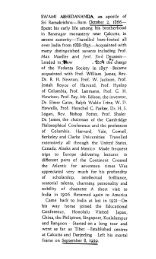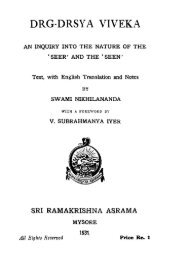<strong>Practical</strong> <strong>Vedanta</strong>of matter or force, can only be looked upon as the play of a certain will, and thatwill again can only be looked upon as separate from the universe. Thus a manfrom such a standpoint has to see himself as composed of a dual nature, body andsoul, and this soul, though limited, is individually complete in itself. Such a man'sideas of immortality and of the future life would necessarily accord with his ideaof soul. These phases have been kept in the <strong>Vedanta</strong>, and it is, therefore, necessaryfor me to present to you a few of the popular ideas of dualism. According to thistheory, we have a body, of course, and behind the body there is what they call afine body. This fine body is also made of matter, only very fine. It is the receptacleof all our Karma, of all our actions and impressions, which are ready to spring upinto visible forms. Every thought that we think, every deed that we do, after acertain time becomes fine, goes into seed form, so to speak, and lives in the finebody in a potential form, and after a time it emerges again and bears its results.These results condition the life of man. Thus he moulds his own life. Man is notbound by any other laws excepting those which he makes for himself. Ourthoughts, our words and deeds are the threads of the net which we throw roundourselves, for good or for evil. Once we set in motion a certain power, we have totake the full consequences of it. This is the law of Karma. Behind the subtle body,lives Jiva or the individual soul of man. There are various discussions about theform and the size of this individual soul. According to some, it is very small likean atom; according to others, it is not so small as that; according to others, it isvery big, and so on. This Jiva is a part of that universal substance, and it is alsoeternal; without beginning it is existing, and without end it will exist. It is passingthrough all these forms in order to manifest its real nature which is purity. Everyaction that retards this manifestation is called an evil action; so with thoughts. Andevery action and every thought that helps the Jiva to expand, to manifest its realnature, is good. One theory that is held in common in India by the crudest dualistsas well as by the most advanced non-dualists is that all the possibilities andpowers of the soul are within it, and do not come from any external source. Theyare in the soul in potential form, and the whole work of life is simply directedtowards manifesting those potentialities.They have also the theory of reincarnation which says that after the dissolution ofthis body, the Jiva will have another, and after that has been dissolved, it willagain have another, and so on, either here or in some other worlds; but this worldis given the preference, as it is considered the best of all worlds for our purpose.Other worlds are conceived of as worlds where there is very little misery, but forthat very reason, they argue, there is less chance of thinking of higher things there.As this world contains some happiness and a good deal of misery, the Jiva sometime or other gets awakened, as it were, and thinks of freeing itself. But just asvery rich persons in this world have the least chance of thinking of higher things,so the Jiva in heaven has little chance of progress, for its condition is the same asthat of a rich man, only more intensified; it has a very fine body which knows nodisease, and is under no necessity of eating or drinking, and all its desires arefile:///C|/Documents%20and%20Settings/Chitra%20Selva...oksBySwami/<strong>Practical</strong><strong>Vedanta</strong>/<strong>Practical</strong><strong>Vedanta</strong>PDF.html (34 of 113)2/26/2007 12:24:33 AM
<strong>Practical</strong> <strong>Vedanta</strong>fulfilled. The Jiva lives there, having enjoyment after enjoyment, and so forgets allabout its real nature. Still there are some higher worlds, where in spite of allenjoyments, its further evolution is possible. Some dualists conceive of the goal asthe highest heaven, where souls will live with God for ever. They will havebeautiful bodies and will know neither disease nor death, nor any other evil, andall their desires will be fulfilled. From time to time some of them will come backto this earth and take another body to teach human beings the way to God; and thegreat teachers of the world have been such. They were already free, and wereliving with God in the highest sphere; but their love and sympathy for sufferinghumanity was so great that they came and incarnated again to teach mankind theway to heaven.Of course we know that the Advaita holds that this cannot be the goal or the ideal;bodilessness must be the ideal. The ideal cannot be finite. Anything short of theInfinite cannot be the ideal, and there cannot be an infinite body. That would beimpossible, as body comes from limitation. There cannot be infinite thought,because thought comes from limitation. We have to go beyond the body, andbeyond thought too, says the Advaita. And we have also seen that, according toAdvaita, this freedom is not to be attained, it is already ours. We only forget it anddeny it. Perfection is not to be attained, it is already within us. Immortality andbliss are not to be acquired, we possess them already; they have been ours all thetime.If you dare declare that you are free, free you are this moment. If you say you arebound, bound you will remain. This is what Advaita boldly declares. I have toldyou the ideas of the dualists. You can take whichever you like.The highest ideal of the <strong>Vedanta</strong> is very difficult to understand, and people arealways quarrelling about it, and the greatest difficulty is that when they get hold ofcertain ideas, they deny and fight other ideas. Take up what suits you, and letothers take up what they need. If you are desirous of clinging to this littleindividuality, to this limited manhood, remain in it, have all these desires, and becontent and pleased with them. If your experience of manhood has been very goodand nice, retain it as long as you like; and you can do so, for you are the makers ofyour own fortunes; none can compel you to give up your manhood. You will bemen as long as you like; none can prevent you. If you want to be angels, you willbe angels, that is the law. But there may be others who do not want to be angelseven. What right have you to think that theirs is a horrible notion? You may befrightened to lose a hundred pounds, but there may be others who would not evenwink if they lost all the money they had in the world. There have been such menand still there are. Why do you dare to judge them according to your standard?You cling on to your limitations, and these little worldly ideas may be yourhighest ideal. You are welcome to them. It will be to you as you wish. But thereare others who have seen the truth and cannot rest in these limitations, who havedone with these things and want to get beyond. The world with all its enjoymentsis a mere mud-puddle for them. Why do you want to bind them down to yourfile:///C|/Documents%20and%20Settings/Chitra%20Selva...oksBySwami/<strong>Practical</strong><strong>Vedanta</strong>/<strong>Practical</strong><strong>Vedanta</strong>PDF.html (35 of 113)2/26/2007 12:24:33 AM
- Page 1 and 2: Practical VedantaPractical VedantaP
- Page 3 and 4: Practical Vedantaworld. If I am a s
- Page 5 and 6: Practical Vedantadifference is only
- Page 7 and 8: Practical VedantaThe ideal of faith
- Page 9 and 10: Practical Vedantamoment of our live
- Page 11 and 12: Practical Vedantaof the Christs and
- Page 13 and 14: Practical Vedanta"This life is Brah
- Page 15 and 16: Practical Vedantadark fifteen days,
- Page 17 and 18: Practical Vedantalife. This is the
- Page 19 and 20: Practical Vedantaeverything would b
- Page 21 and 22: Practical Vedantait is only through
- Page 23 and 24: Practical Vedantawhich is that subt
- Page 25 and 26: Practical Vedantanoumenon and pheno
- Page 27 and 28: Practical Vedantato which is the be
- Page 29 and 30: Practical VedantaAbsolute.The finit
- Page 31 and 32: Practical Vedantawhich is not the q
- Page 33: Practical Vedantaexperience that th
- Page 37 and 38: Practical Vedantabetween the pure r
- Page 39 and 40: Practical Vedantacome out straight.
- Page 41 and 42: Practical Vedantawar with one anoth
- Page 43 and 44: Practical Vedantanobody could under
- Page 45 and 46: Practical VedantaMy idea, therefore
- Page 47 and 48: Practical Vedantathe same methods.
- Page 49 and 50: Practical Vedantavarious minds, all
- Page 51 and 52: Practical Vedantabrotherhood; but t
- Page 53 and 54: Practical Vedantabrotherhood, but w
- Page 55 and 56: Practical Vedantawe all go with ves
- Page 57 and 58: Practical Vedantareason. What can y
- Page 59 and 60: Practical Vedantabeen preached in t
- Page 61 and 62: Practical Vedantathe husband kisses
- Page 63 and 64: Practical Vedantaof the knowledge a
- Page 65 and 66: Practical Vedantafor those who only
- Page 67 and 68: Practical Vedantasun exists because
- Page 69 and 70: Practical Vedantaof death was pleas
- Page 71 and 72: Practical VedantaGod. We must learn
- Page 73 and 74: Practical Vedantaa plague comes, it
- Page 75 and 76: Practical VedantaAtman? "As with a
- Page 77 and 78: Practical Vedantathat immortal One,
- Page 79 and 80: Practical Vedantaand the third egoi
- Page 81 and 82: Practical VedantaWitness of the uni
- Page 83 and 84: Practical VedantaPractical Vedanta1
- Page 85 and 86:
Practical Vedantaeternal ; every ot
- Page 87 and 88:
Practical Vedantafaculty, Buddhi, w
- Page 89 and 90:
Practical VedantaPractical Vedanta1
- Page 91 and 92:
Practical Vedantastepping-stone to
- Page 93 and 94:
Practical Vedantarecognition? Findi
- Page 95 and 96:
Practical Vedantasentient." This is
- Page 97 and 98:
Practical Vedantaessentially differ
- Page 99 and 100:
Practical Vedantaexistence is limit
- Page 101 and 102:
Practical Vedantalive, for I am lif
- Page 103 and 104:
Practical Vedantasee from Kapila's
- Page 105 and 106:
Practical Vedantalimitation, but th
- Page 107 and 108:
Practical Vedantaperfect, infinite,
- Page 109 and 110:
Practical Vedantaindividuality, of
- Page 111 and 112:
Practical Vedantarepeat [something]
- Page 113:
Practical Vedantaperson who dies in
















